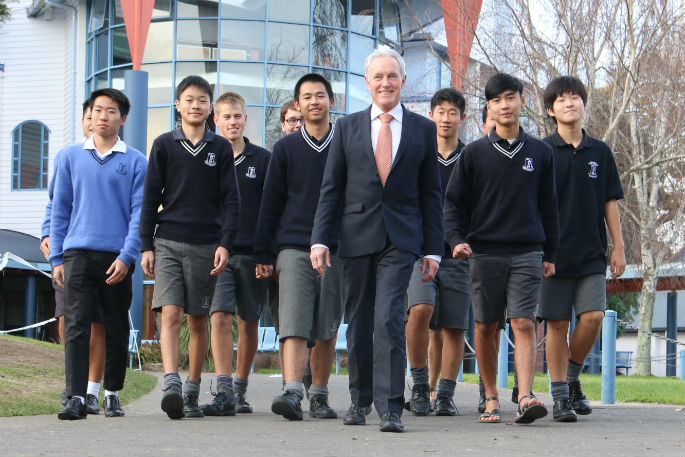It's become a hairy discipline issue for secondary schools.
And it threatens to damage the economy's fifth largest export earner – the $2.85 billion international student industry.
Principals say it's an issue demanding urgent clarity. What rights do principals have when international students breach school rules and the laws of the land?
Tauranga Boys' College unwittingly became the catalyst for debate.
Principal Robert Mangan has the best possible interests of his international students, and their parents, at heart. As do most other college principals who host international students.
That was certainly the message that Robert was getting back from agents for parents overseas. 'They need to know we are responsible for their pastoral care, their health and safety and management of their behaviour.” And Robert, like other host principals, assumed theirs was a 24/7 responsibility.
'We have a duty of care to them.” Not only while at Tauranga Boys' College but while they are in this country. Then the bombshell.
But last week the High Court ruled Tauranga Boys' College acted unlawfully in expelling and excluding German international students caught smoking cannabis off school grounds and outside school hours back in 2014. The facts weren't disputed by the students.
'And again feedback from international students agents in Germany has been very supportive of the school's actions,” says Robert.
But now the waters are muddied.
'And schools need absolute clarity and best practice guidance to manage similar issues where international students break not only school and homestay rules but also the laws of the country,” says the principal.
That's a concern echoed across the Kaimai Range into Rotorua. And round the country perhaps. There the principal of John Paul College, and Secondary Principals' Association NZ executive, Patrick Walsh says schools had taken the view they had responsibility for international students 24/7.
The High Court decision against Tauranga Boys' College appeared to contradict that. Now principals are planning to meet with ministry officials to discuss the issue.
'Now we are calling on the Schools International Education Business Association and the New Zealand Qualifications Authority to provide that absolute clarity,” says Robert.
Initially, on legal advice, the college applied a breach of contract to the German students. Then after further legal advice the students were either expelled, excluded or returned to school with conditions attached, this time under provisions of the Education Act.
A complaint was laid with the International Education Appeal Authority, which found against the college. And after seeking a judicial review the college was again found in breach.
The point of contention is the High Court ruling that the Education Act didn't apply to the Tauranga Boys' College situation as schools do not have jurisdiction over students outside school hours.
So where does the college's responsibility for pastoral care, health and safety and behaviours start and stop? And what rights do schools have to discipline international students?
If teachers, principals or schools are demanding clarity, so are parents. 'Agents [in Germany] want to be able to assure parents with total confidence that the college is responsible for their children. We pride ourselves on being able to provide that type of environment and care,” says Robert.
And most importantly, he says he won't abdicate his responsibility to teach both domestic and international students that their actions have consequences. 'We will help guide them to make the right choices and take responsibility for their actions as we focus on growing boys into good men.”
The principal also makes clear the college's unshakeable stance on illegal drugs. 'We will maintain a firm line and a zero tolerance on the use of illegal drugs within the college environment. And we will continue to give a clear message to our boys and community of our view of their use in the wider community.”
And he will continue to play hardball.
'We will use all means legally available in managing this very significant societal issue. We will use the [High Court] decision to guide our future actions should a similar situation occur.”
But they will need the support and guidance of the NZQA and SIEBA to do so.
In the meantime the country's largest secondary school, Rangitoto on Auckland's Northshore, has introduced sniffer dogs to drive home its zero drug tolerance message to students.
The dogs will be used 'if and when needed” to keep drugs out of the school.

